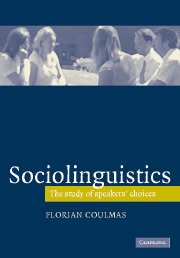Book contents
- Frontmatter
- Contents
- 1 Introduction: notions of language
- Part I Micro-choices
- Part II Macro-choices
- 7 Code-switching: linguistic choices across language boundaries
- 8 Diglossia and bilingualism: functional restrictions on language choice
- 9 Language spread, shift and maintenance: how groups choose their language
- 10 Language and identity: individual, social, national
- 11 Language planning: communication demands, public choice, utility
- 12 Select letters: a major divide
- 13 The language of choice
- Glossary of terms
- References
- Internet resources
- Index
- References
9 - Language spread, shift and maintenance: how groups choose their language
Published online by Cambridge University Press: 05 June 2012
- Frontmatter
- Contents
- 1 Introduction: notions of language
- Part I Micro-choices
- Part II Macro-choices
- 7 Code-switching: linguistic choices across language boundaries
- 8 Diglossia and bilingualism: functional restrictions on language choice
- 9 Language spread, shift and maintenance: how groups choose their language
- 10 Language and identity: individual, social, national
- 11 Language planning: communication demands, public choice, utility
- 12 Select letters: a major divide
- 13 The language of choice
- Glossary of terms
- References
- Internet resources
- Index
- References
Summary
Languages, like organic species can be classified into groups and subgroups … Dominant languages and dialects spread and lead to the gradual extinction of other tongues.
Charles Darwin, The Descent of Man and Selection in Relation to SexThe lure of English has not left us. And until it goes, our own languages will remain paupers.
Mohandas Gandhi (1965)Stable and unstable language arrangements
One of the hallmarks of diglossia is its stability over long periods of time, a feature it shares with grassroots bilingualism. In both cases the population is territorially stationary, exhibiting no abrupt changes in residence patterns or language choice. If we think, for example, of German-speaking Switzerland, the Basque country and Jammu, north-west India, the language scenarios of these regions have lasted for many generations. No uncertainties or challenges undermined the alternating language-choice conventions for Swiss German/High German, Basque/Spanish and Pashto/Urdu. Stability is a rather vague notion. If, for present purposes, it is defined to mean that nobody alive remembers different language-choice conventions, it implies that basic patterns have been in place for at least four generations. In this sense the three cases, different though they are in terms of sociogenesis and functional allocation of codes, exemplify stable language arrangements.
However, the stability of multilingual arrangements is by no means the rule. Around the globe speech communities live in close proximity, influencing each other. From a language-centred point of view as suggested by Darwin's above-quoted analogy, languages influence each other, expand, contract or die.
- Type
- Chapter
- Information
- SociolinguisticsThe Study of Speakers' Choices, pp. 146 - 170Publisher: Cambridge University PressPrint publication year: 2005



